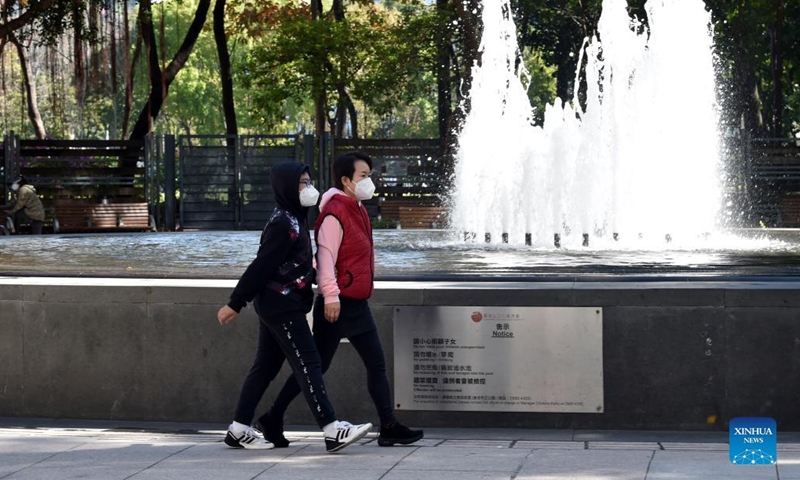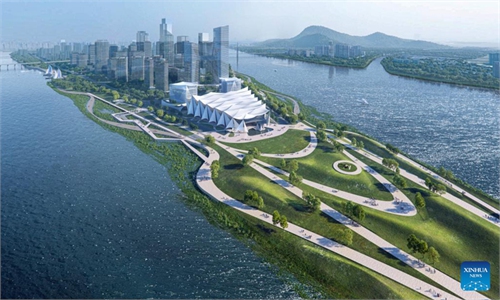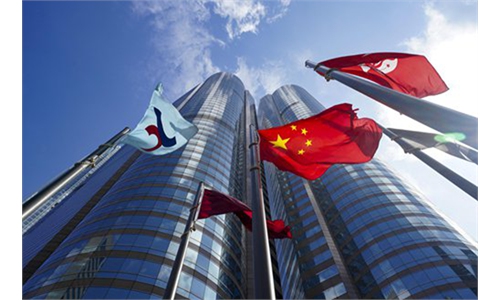Hong Kong to scrap mask mandate; A step to achieve normalcy as city launches major push to welcome global tourists, investors

People wearing face masks walk past a fountain at Victoria Park in Hong Kong, south China, March 8, 2022. The Hong Kong Special Administrative Region (HKSAR) reported 28,475 new COVID-19 cases on March 8. (Xinhua/Lo Ping Fai)
Hong Kong will scrap mask mandate starting Wednesday after three years' fight against COVID-19, HKSAR Chief Executive John Lee announced on Tuesday, 958 days since the rule was imposed.
Following the lifting of the mandate, local residents will no longer need to wear masks indoors, outdoors and in public transportation, except in high-risk places such as nursing homes and hospitals.
The move was viewed as a step to achieve normalcy, showing greater openness to the world when the financial hub has launched a major push to welcome back global tourists and investors, also a necessary move following a stable COVID-19 and influenza trend.
The end of the mask mandate means the city ditched the last remaining social distancing measures, allowing the public to show their smile and say "Hello Hong Kong" to each other, Lo Chung-Mau, secretary of health of the HKSAR government, said at Tuesday's press conference.
Lo stated that the decision to remove the mask mandate was taken because of the overall situation of the controllable outbreak in Hong Kong, such as no signs of rising confirmed respiratory disease cases and no major outbreaks among schools.
The influenza height is also nearing its end. Related positive cases can experience an upward trend when mask mandate is removed, but the risk is controllable, Lo noted.
The government did not want to lift the mandate too early for fear of a massive winter influenza outbreak that could overwhelm the public hospital system at the same as COVID-19, David Hui Shu-cheong, an expert advisor to the HKSAR government on COVID-19, told the Global Times on Tuesday.
Hong Kong accepts that COVID-19 has become endemic. The overall vaccination rates are high enough, and many people in the community have been infected before, creating strong hybrid immunity in the community, Hui noted.
Though the city is about to scrap the mask mandate, masks are still required when entering medical institutions to protect high-risk populations and are recommended to be worn in stuffy places, Lo highlighted.
Lee also noted that people entering high-risk places such as nursing homes and hospitals will still be required to wear masks in an administrative and non-legal manner.
If there are outbreaks due to influenza or new COVID-19 variants in the community, then reintroducing the masking mandate outdoors would be necessary, Hui said.
The mask mandate came into effect on July 15, 2020. Failure to abide by the rule was at risk of facing fines of up to HK$10,000 ($1,275).
Hong Kong has gradually emerged from COVID-19. The city resumed border exchange with the mainland on January 8 and then fully opened the border on February 6. All international arrivals to Hong Kong will no longer be required to present vaccination records as Hong Kong fully reopens.
The lift of the mandate comes at a good time when Hong Kong has launched a campaign themed "Hello Hong Kong" this year to attract tourists from around the globe. "I believe that the city will be more prosperous and energetic in 2023," said the Chief Executive.
Starting from Monday, Macao also dropped its COVID-19 mask requirements for outdoor locations, except for public transportation, hospitals, and in some indoor places.
In the past three years, the mask was considered as one of the key social distancing measures to prevent and reduce the spread of the coronavirus. Discussions over whether to scrap masks also rise as the mainland has overcome the height of COVID-19.
Health authorities had discussions about the end of wearing masks in Chinese cities but the final decision has yet to be made, a senior expert from the Chinese Center for Disease Control and Prevention (China's CDC) who prefer not to be named revealed to the Global Times.
China's health authorities currently hold a cautious attitude about it. Chang Zhaorui from China CDC told a recent press conference on February 23 that wearing masks is still a necessary measure as part of personal protection as now is a high season for respiratory disease and sporadic COVID-19 cases are still occurring in some regions.
Chang warned the prevalence of influenza and respiratory syncytial virus are posing threat to high-risk regions including nursing homes, schools and nurseries.



